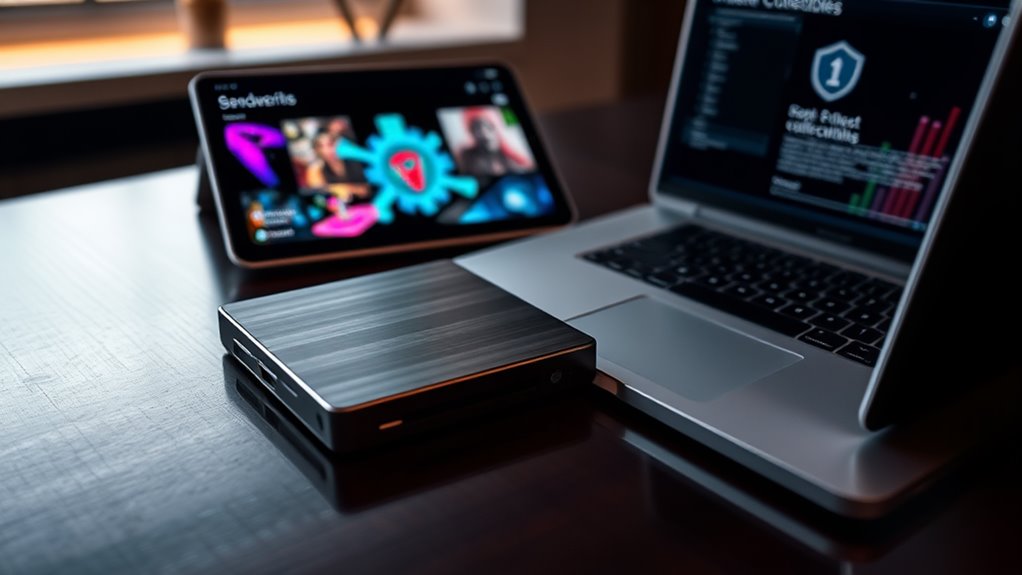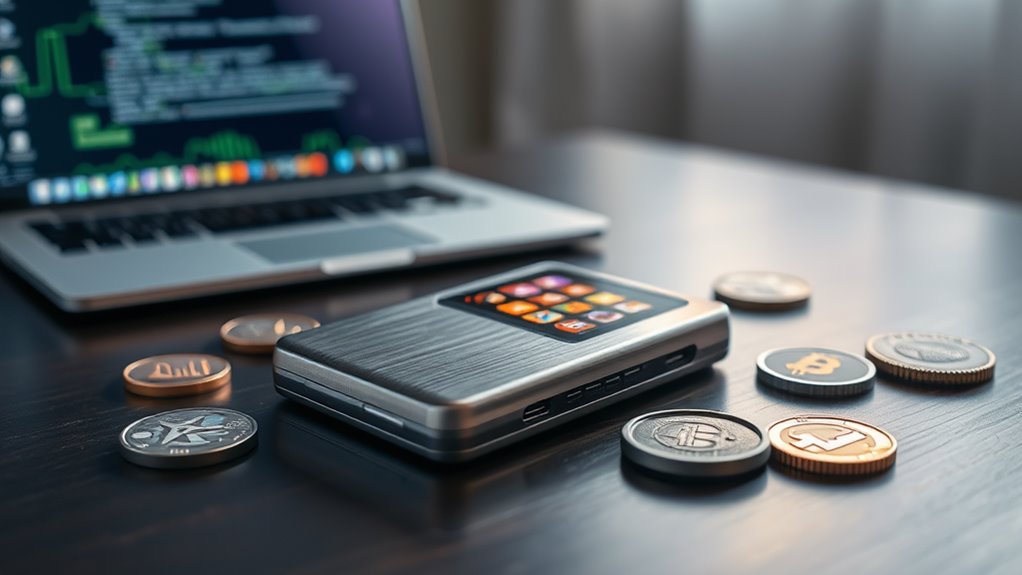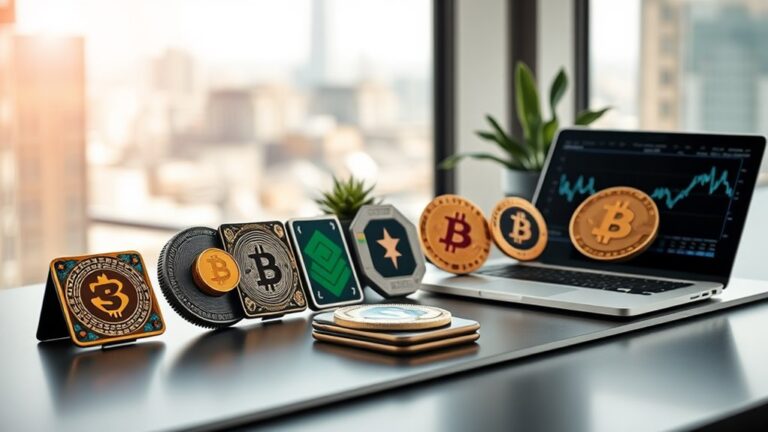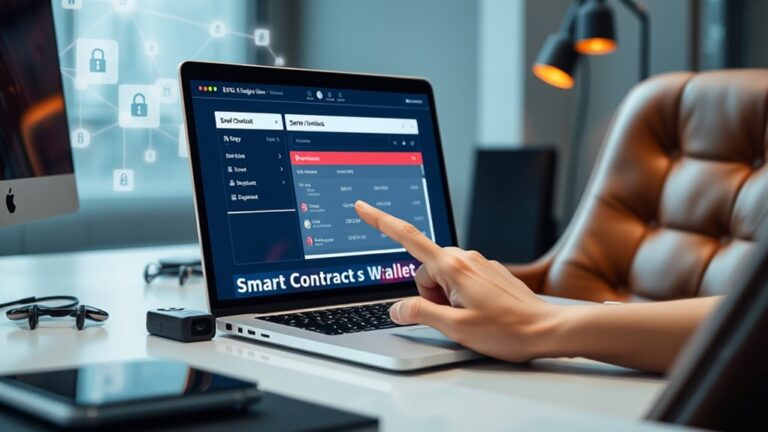
NFT Wallets: Storing Digital Collectibles Safely
NFT wallets are essential for storing digital collectibles securely. They come in various types, including hot wallets for quick access and cold wallets for enhanced security. Users must be aware of security risks, such as phishing and malware attacks. Best practices include using strong passwords, two-factor authentication, and safeguarding seed phrases. Blockchain technology enhances security through immutable records and encrypted transactions. Understanding these elements helps users choose an appropriate wallet to protect their digital assets. More insights follow on wallet functionalities.
Key Takeaways
- Use cold wallets for long-term storage of NFTs to enhance security against online threats.
- Implement two-factor authentication to add an extra layer of protection to your NFT wallet.
- Regularly create strong, unique passwords and change them periodically to safeguard your digital assets.
- Be vigilant against phishing attacks by verifying links and sources before entering sensitive information.
- Consider using specialized wallets designed for NFTs that offer tailored features and enhanced security measures.
Understanding NFT Wallets

NFT wallets serve as essential tools for individuals looking to manage their digital assets in the form of non-fungible tokens (NFTs).
These wallets feature user-friendly interfaces that allow seamless navigation across various devices. They support multiple blockchain networks, which enhances flexibility in managing NFTs from different ecosystems.
In addition, NFT wallets integrate directly with leading marketplaces, providing users with easy access to trading opportunities.
Security measures are vital, including secure key management to protect private keys and transaction processing capabilities for sending and receiving NFTs.
Moreover, features such as transaction tracking and analytics offer valuable insights into asset performance, ensuring users can effectively manage their digital collections with confidence and ease.
Types of NFT Wallets

As the popularity of digital assets continues to grow, understanding the various types of wallets available for managing non-fungible tokens becomes increasingly important.
NFT wallets can be categorized into several types, each with distinct features and purposes:
- Hot Wallets: These are internet-connected wallets that allow for quick transactions but are more vulnerable to security risks, such as hacking. Examples include MetaMask and Coinbase Wallet.
- Cold Wallets: Providing offline storage, cold wallets, like Ledger devices, offer enhanced security for long-term asset storage but require a purchase.
- Custodial Wallets: Managed by third parties, these wallets simplify usage but limit user control over assets, posing risks associated with provider breaches.
Each wallet type serves different needs, balancing convenience and security. For optimal safety, many users combine both hot and cold wallets to achieve a balance between convenience and security.
Security Risks Associated With NFT Wallets

Managing digital assets in the form of non-fungible tokens comes with inherent security risks that users must navigate carefully.
Phishing attacks are a common threat, often executed through deceptive emails or fake links, leading users to reveal sensitive information. Identity theft can occur when scammers impersonate legitimate platforms, while fake marketplaces trick users into sharing credentials.
Phishing attacks and identity theft are prevalent risks, as scammers impersonate platforms and create fake marketplaces to exploit users.
Additionally, rug pull scams involve fraudulent projects that vanish with investors’ funds. Malware attacks, often disguised as fake airdrops, can compromise devices and access wallet credentials.
Smart contract vulnerabilities also pose risks; flaws can be exploited for unauthorized ownership changes.
Finally, the unregulated nature of the NFT market requires users to remain vigilant and informed to mitigate these dangers effectively. Implementing strong, unique passwords and enabling two-factor authentication can significantly enhance the security of NFT wallets.
Best Practices for NFT Wallet Security

When it comes to securing NFT wallets, implementing two-factor authentication is essential to provide an additional layer of protection against unauthorized access.
Creating strong, unique passwords further enhances security, making it more difficult for potential hackers to gain entry.
Additionally, safeguarding the seed phrase is critical, as it serves as a recovery key for the wallet and should be stored offline and kept confidential. Staying informed about common threats like phishing attacks and exchange hacks is also vital for maintaining the security of your digital assets.
Two-Factor Authentication Importance
Two-Factor Authentication (2FA) is an essential component of securing NFT wallets, considerably enhancing the protection of digital assets. By implementing 2FA, users add an additional verification step, making it more challenging for unauthorized individuals to access their wallets.
The importance of 2FA can be summarized in several key points:
- Enhanced Security: A second layer of verification considerably reduces the risk of unauthorized access.
- Prevention of Unauthorized Access: Even if a password is compromised, 2FA acts as a safeguard by requiring further identification.
- Protection Against Phishing Attacks: With 2FA in place, phishing attempts become less effective since attackers cannot bypass the additional verification.
Incorporating 2FA is a vital step toward ensuring the safety and integrity of NFT holdings. Additionally, users should consider using hardware wallets to further enhance the security of their digital assets.
Strong Password Creation
Creating strong passwords is a fundamental step in safeguarding NFT wallets against unauthorized access. A secure password should incorporate a mix of uppercase and lowercase letters, along with numbers and special symbols. This combination enhances resistance to brute-force attacks.
Using a password generator can help create unique, random passwords for each account, making them difficult to guess. It is important to avoid personal information, like names or birthdays, in password creation.
Regular updates of passwords, along with the use of reputable password managers, can greatly enhance security. These tools not only store complex passwords but also prevent reuse across multiple accounts.
Ultimately, keeping passwords private and secure is essential for protecting valuable digital assets.
Seed Phrase Security
Seed phrases serve as the backbone of NFT wallet security, playing an essential role in the recovery and management of digital assets. These phrases typically consist of 12 to 24 unique words, allowing users to restore their wallets on different devices. To guarantee the security of seed phrases, individuals should adhere to the following best practices:
- Write seed phrases on paper and store them in secure, offline locations, avoiding any digital storage methods.
- Use fireproof safes or lockboxes to protect seed phrases from physical damage and unauthorized access.
- Regularly review and educate oneself about potential scams targeting seed phrases to stay informed and vigilant.
Additionally, understanding that seed phrases act as a master key to regenerate private keys is essential for ensuring the safety of your funds. Implementing these practices can greatly enhance the security of NFT wallets and protect valuable digital assets.
Importance of Blockchain Technology in NFT Security

Blockchain technology plays an essential role in ensuring the security of Non-Fungible Tokens (NFTs) by providing a reliable framework for transactions and ownership verification.
Its immutable ledgers record transactions permanently, preventing any alterations that could lead to fraud. Each NFT boasts a unique transaction history, enhancing transparency and trust among users.
Smart contracts further strengthen security by automating transactions and enforcing ownership rules, minimizing the risk of human error.
Additionally, public and private key cryptography protects ownership, allowing only authorized individuals to transfer NFTs.
The decentralized nature of blockchain eliminates intermediaries, reducing transaction costs and enhancing security by distributing data across the network.
Together, these elements create a secure environment for NFT transactions, fostering user confidence.
The Role of Hardware Wallets in Protection

With the rise of Non-Fungible Tokens (NFTs) and their unique ownership characteristics, the importance of secure storage solutions has become increasingly evident.
The surge of Non-Fungible Tokens highlights the critical need for secure storage solutions to protect unique digital assets.
Hardware wallets play a vital role in protecting these digital assets, offering several key benefits:
- Offline Storage: By storing private keys offline, hardware wallets minimize the risk of hacking and theft.
- Enhanced Security: Many devices utilize military-grade security measures, ensuring robust protection against physical and digital threats.
- Secure Transaction Signing: Transactions are signed off the internet, reducing exposure to phishing attacks and ensuring that ownership remains secure. Additionally, these wallets provide a secure offline storage solution for private keys, which keeps them safe from online threats such as malware.
Software Wallets: Convenience vs. Security

Software wallets, often called hot wallets, provide easy access to digital collectibles through online connectivity. They are favored by users for their user-friendly interfaces and compatibility across devices, making them ideal for active trading.
However, this convenience comes with security risks, as these wallets are more vulnerable to hacking and phishing attacks. While features like complex passwords and multi-factor authentication enhance security, weaknesses exist if these measures are not implemented correctly.
Centralized servers also pose a risk, potentially leading to data loss. Despite these concerns, the ease of use and integration with NFT marketplaces keep software wallets popular among NFT investors. Additionally, software wallets facilitate transactions by using private keys to sign and broadcast transactions to the blockchain.
Future Developments in NFT Wallet Security

As the landscape of NFTs continues to evolve, the security of wallets used to store these digital assets is becoming increasingly important.
Future developments in NFT wallet security are expected to focus on several key areas:
Future advancements in NFT wallet security will prioritize enhanced protocols, authentication, and multichain compatibility for improved asset protection.
- Improved Security Protocols: Advanced encryption methods and decentralized security modules will enhance asset protection while integrating hardware security modules for physical safety.
- Advanced Authentication Technologies: Biometric features such as fingerprint, facial, and voice recognition, along with two-factor authentication, will create a more secure login experience.
- Multichain Compatibility: Support for multiple blockchains and seamless cross-chain transfers will guarantee that assets can be managed efficiently across various platforms, enhancing both security and accessibility.
These advancements aim to safeguard digital collectibles against emerging threats.
Specialized Wallets for Unique Digital Assets

Specialized wallets for unique digital assets, such as NFTs, offer tailored features designed to enhance the user experience and security.
These wallets often incorporate advanced security measures, including encryption and two-factor authentication, to protect valuable digital items from unauthorized access.
Additionally, their unique functionalities cater specifically to the needs of NFT collectors and creators, making them essential tools in the evolving landscape of digital assets.
Tailored Features for NFTs
In the evolving landscape of digital assets, NFT wallets have emerged with tailored features that distinguish them from traditional cryptocurrency wallets.
These specialized wallets cater to the unique characteristics of non-fungible tokens, enhancing user experience and functionality.
Key features include:
- Customized Asset Storage: Designed for the indivisibility and uniqueness of NFTs, ensuring proper management.
- Decentralized Storage: Distributing wallet data mitigates risks associated with data loss from single-point failures.
- Transaction Management: Streamlines transactions between NFT marketplaces, facilitating efficient trading.
These tailored features not only simplify the management of NFTs but also provide users with tools that enhance their engagement and trading strategies, making NFT wallets essential for those invested in digital collectibles.
Enhanced Security Measures
The increasing popularity of NFTs has led to a heightened focus on security measures specifically designed for these unique digital assets.
Advanced authentication methods, like two-factor authentication, provide an added layer of protection. Hardware wallets, such as Ledger Nano, store private keys offline, minimizing cyber threats. Encryption technologies safeguard data, while regular software updates help close potential vulnerabilities.
Specialized wallets, including cold storage options, considerably reduce hacking risks. Multi-signature wallets enhance security by requiring multiple approvals for transactions. This collaborative approach not only reduces unauthorized access but also ensures that the control of digital assets is shared among trusted parties.
Additionally, users are advised to implement strong passwords and manage seed phrases carefully. By avoiding suspicious links and using secure networks, NFT holders can further protect their valuable digital collectibles against scams and theft.
Frequently Asked Questions
Can I Recover My NFTS if I Lose My Wallet?
Recovering lost NFTs depends on backup methods. If seed phrases or private keys are secured, recovery is possible. Without them, access could be permanently lost, emphasizing the importance of effective backup strategies for digital assets.
Are NFTS Insured Against Theft or Loss?
NFTs can be insured against theft, loss, and cyber threats, yet coverage remains limited. As the market evolves, businesses seek tailored policies amidst regulatory uncertainties, highlighting the need for thorough protection in this emerging landscape.
How Do I Transfer NFTS Between Wallets?
To transfer NFTs between wallets, one must guarantee compatibility, select the NFT, input the recipient’s address, confirm transaction details, and initiate the transfer, all while considering security and potential fees involved in the process.
What Happens if a Wallet Provider Shuts Down?
When a bridge collapses, travelers face uncertainty; similarly, if a wallet provider shuts down, users may encounter transaction failures and heightened security risks, necessitating swift adaptation to alternative services and recovery options for their assets.
Can I Use Multiple Wallets for My NFTS?
Multiple wallets can be utilized for NFTs, enhancing security and organization. This approach allows users to manage collections effectively, leverage unique features, and mitigate risks associated with market volatility and potential wallet compromises.
Conclusion
In summary, the careful consideration of NFT wallets is essential for collectors seeking to safeguard their digital treasures. By understanding the various types of wallets and recognizing security risks, users can make informed choices. Emphasizing best practices, such as utilizing hardware wallets, enhances protection against potential pitfalls. As technology evolves, the importance of secure storage solutions will continue to grow, ensuring that digital assets remain safe and sound in an increasingly digital world.














